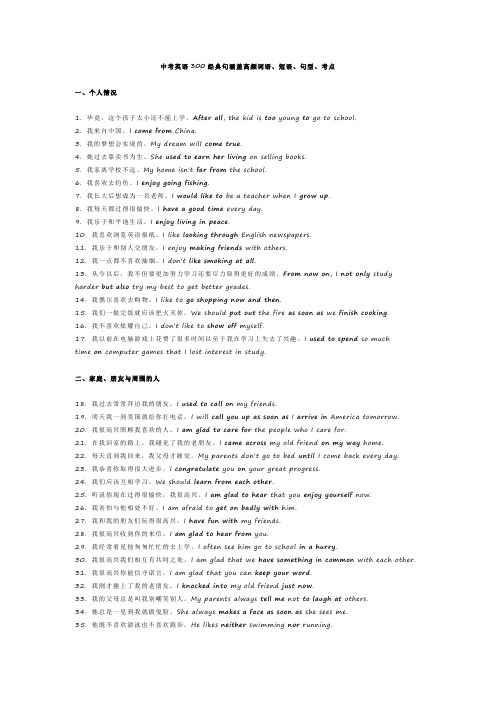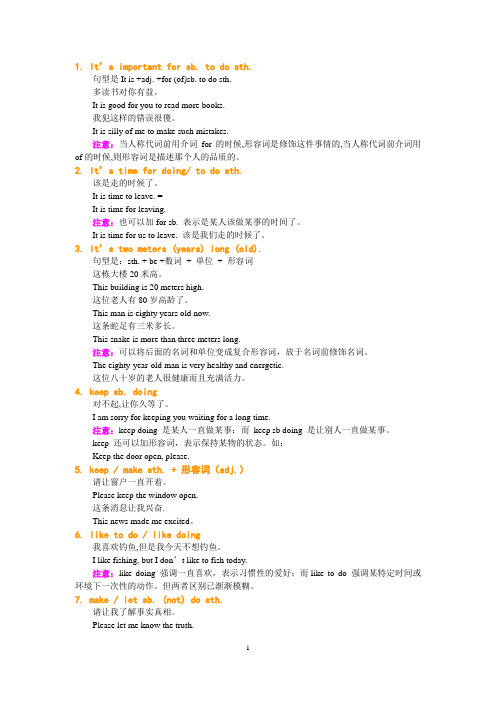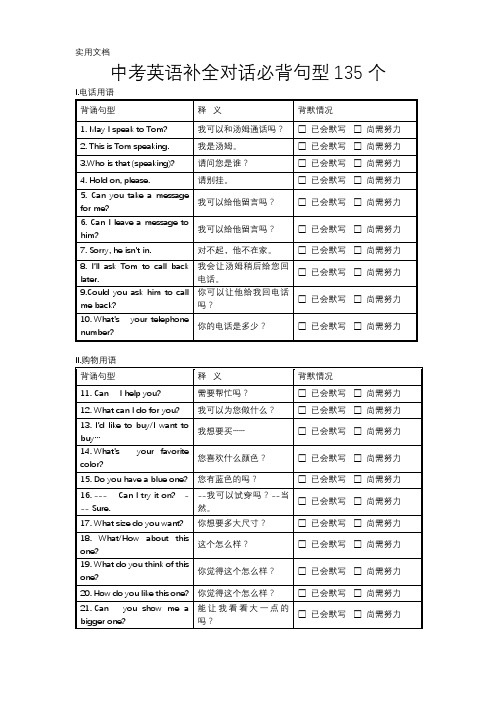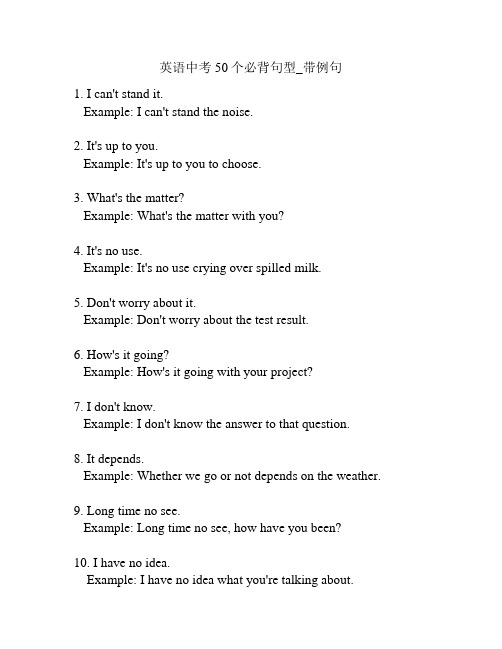中考英语高频考点句型汇总【最新】
初中英语中考常考固定短语句型汇总(共80个)

中考英语常考固定短语句型1.much,a little, even, still等表示程度的副词可用来修饰比较级;而very, too, so, quite(表示身体健康的quiter除外)习惯上不用来修饰比较级。
2.arrive in +大地点/ arrive at +小地点= get to … = reach +…(到达…)We have arrived at the railway station.3.Let's +动词原形4.长,宽,高的表达法:数字+量词+形容词。
如:20 metres wide二十米宽Well 30 meters deepThis is a two-meter-high tree5.stop doing sth 停止正在做的事情Hearing the knock at the door, Dad stopped his work.6.stop to do sth停下(正在做的事情)来做另一件事Xiao Ming is tired. He stops to have a restWhen the teacher came in, the students stopped talking7.stop sb from doing sth 阻止某人干某事We should prevent/stop people from damaging the ecological environment.Dad always prevents/stops me from swimming in the river8.can't stop doing sth 情不自禁干某事Hearing this sad story, we can't help cryingHearing this joke, everyone couldn't help laughing9.There is +单数可数名词/不可数名词+ 地点状语.10.How many+复数名词+are there+介词短语?How many students are there in your class?11.remember to do sth记得将要干某事(事没做)Remember to lock the door when you leave.12.remember doing sth .记得曾经做过某事(事已做)I remember locking the door when I left.13.在季节、月份、星期、节日、球类运动、棋类游戏的名词之前不用冠词。
中考英语300经典句涵盖高频词语、短语、句型、考点

中考英语300经典句涵盖高频词语、短语、句型、考点一、个人情况1. 毕竟,这个孩子太小还不能上学。
After all, the kid is too young to go to school.2. 我来自中国。
I come from China.3. 我的梦想会实现的。
My dream will come true.4. 她过去靠卖书为生。
She used to earn her living on selling books.5. 我家离学校不远。
My home isn't far from the school.6. 我喜欢去钓鱼。
I enjoy going fishing.7. 我长大后想成为一名老师。
I would like to be a teacher when I grow up.8. 我每天都过得很愉快。
I have a good time every day.9. 我乐于和平地生活。
I enjoy living in peace.10. 我喜欢浏览英语报纸。
I like looking through English newspapers.11. 我乐于和别人交朋友。
I enjoy making friends with others.12. 我一点都不喜欢抽烟。
I don't like smoking at all.13. 从今以后,我不但要更加努力学习还要尽力取得更好的成绩。
From now on, I not only study harder but also try my best to get better grades.14. 我偶尔喜欢去购物。
I like to go shopping now and then.15. 我们一做完饭就应该把火灭掉。
We should put out the fire as soon as we finish cooking.16. 我不喜欢炫耀自己。
初中英语2024届中考热点句型汇总(网红带货+直播+百搭词组)

中考英语热点句型一、网红带货网红:social media influencerHe is not only a social media influencer, but also a teacher.他不只是个网红,还是个教师。
很多时候,我们都会把某个行业的意见领袖简称为:KOL,也可以表达网红的意思。
eg:Belling says influencer marketing was critical from day one, when popchips was just a little indie brand that could.Belling 说,网红带货从第一天起就至关重要,当时 popchips 还只是一个小的独立品牌。
二、直播直播:live streamThis is a wonderful live stream.这是一场精彩的直播。
相关词汇:网红直播:live video streaming/ network broadcast网络主播:network anchorlive stream 直播live 表示:现场直播stream 表示:流量eg:Let's watch the live stream together!我们一起看直播吧!【相关热词】e-commerce live streaming 电商直播direct broadcasting room 直播间online platform 网络平台social media 社交媒体Tik Tok 抖音purchasing power 购买力fan economy 粉丝经济live streaming economy 直播经济limited edition 限量发售anchorman /’æŋkəmæn/ 男主播anchorwoman /’æŋkəwʊmən/ 女主播streaming online 在线直播key opinion leader 网红KOLnew media 新媒体follow / unfollow 关注 / 取关hit the LIKE / thumbs up 点赞reward function 打赏功能flood / explode the screen 刷屏social network / networking 社交网络attract followers 圈粉【小拓展】“明星代言”英语可以说成 celebrity endorsementendorse /ɪn’dɔs/ v.代言;宣传endorsement n.代言开箱直播:unboxing live stream美妆直播:beauty live stream穿搭直播:fashion live stream【相关人物】口红一哥——李佳琦The 27-year-old Li Jiaqi’s maverick sales technique has won him the nickname "Lipstick Brother No 1".Once an unassuming shop assistant earning a modest salary in Nanchang in south-east China, he now has more than 40 million followers on Douyin.27岁的李佳琦特立独行的销售技巧为他赢得了“口红一哥”的称号。
中考英语必备50个句型

1. It’s important for sb. to do sth.句型是It is +adj. +for (of)sb. to do sth.多读书对你有益。
It is good for you to read more books.我犯这样的错误很傻。
It is silly of me to make such mistakes.注意:当人称代词前用介词for的时候,形容词是修饰这件事情的,当人称代词前介词用of的时候,则形容词是描述那个人的品质的。
2. I t’s time for doing/ to do sth.该是走的时候了。
It is time to leave. =It is time for leaving.注意:也可以加for sb. 表示是某人该做某事的时间了。
It is time for us to leave. 该是我们走的时候了。
3. It’s two meters (years) long (old).句型是:sth. + be +数词+ 单位+ 形容词这栋大楼20米高。
This building is 20 meters high.这位老人有80岁高龄了。
This man is eighty years old now.这条蛇足有三米多长。
This snake is more than three meters long.注意:可以将后面的名词和单位变成复合形容词,放于名词前修饰名词。
The eighty-year-old man is very healthy and energetic.这位八十岁的老人很健康而且充满活力。
4. keep sb. doing对不起,让你久等了。
I am sorry for keeping you waiting for a long time.注意:keep doing 是某人一直做某事;而keep sb doing 是让别人一直做某事。
中考英语补全对话必背句型135个

□ 已会默写 □ 尚需努力
65.Have you decided where to go?
你决定去哪里了吗?
□ 已会默写 □ 尚需努力
66.Have a good trip.
旅途愉快。
□ 已会默写 □ 尚需努力
67.How was your weekend?
你的周末怎么样?
□ 已会默写 □ 尚需努力
什么时候开始的?
□ 已会默写 □ 尚需努力
39.How often should I take the medicine ?
我应该多久吃一次这种药?
□ 已会默写 □ 尚需努力
40.Drink enough water and have a good rest.
喝足够的水,好好休息。
□ 已会默写 □ 尚需努力
你最喜欢哪个季节?
□ 已会默写 □ 尚需努力
86.What’s the temperature?
温度是多少?
□ 已会默写 □ 尚需努力
VIII.其它用语
表示建议:
背诵句型
释义
背默情况
87.What/How about doing… ?
做……怎么样?
□ 已会默写 □ 尚需努力
88.Why not +V.原… ?
我发烧/头疼。
□ 已会默写 □ 尚需努力
31.Have you taken your temperature? Yes, I have.
你量体温了吗?是的,量了。
□ 已会默写 □ 尚需努力
32. How long have you been like this?
你像这样多久了?
□ 已会默写 □ 尚需努力
中考英语的必考句型

中考英语的必考句型关于中考英语的必考句型1. so + do/be + 主语“So + be/助动词/情态动词 + 主语” 表示前面所述内容也适用于另一人或物。
be、助动词或情态动词的选择视前面陈述句中谓语动词的时态形式而定。
例如:He likes football and so do I.他喜欢足球,我也如此。
Jim was playing football just now and so was Tom.刚才吉姆在踢足球,汤姆也在踢足球。
比较:“So +主语+be/助动词/情态动词.”结构,是用来证实前一句所表达的内容(起强调作用)。
be、助动词或情态动词的选择视前面陈述句中谓语动词的时态形式而定。
A: It is very hot today. 今天天气很热。
B: So it is. 确实如此。
2. not only…but also… 不但……而且……常用来连接语法作用相同的词、短语或句子。
连接两个主语时,谓语动词要和紧靠它的主语在人称和数上保持一致。
例如:She likes not only singing but also dancing.她不但喜欢唱歌,而且喜欢跳舞。
He is not only a good doctor but also a good father.他不但是个好医生而且是个好爸爸。
Not only I but also he is hoping to go there.不但我而且他也想去那儿。
3. prefer…to… 喜欢……胜过…...prefer (doing) sth. to (doing) sth. 意为“两者相比更喜欢(做)其中之一”。
在此结构中,to是介词,接名词或动名词,结构中前后所跟成分一样。
例如:He prefers tea to coffee.茶与咖啡相比,他更喜欢茶。
He prefers doing shopping to going fishing.购物与钓鱼相比,他更喜欢购物。
英语中考50个必背句型_带例句

英语中考50个必背句型_带例句1. I can't stand it.Example: I can't stand the noise.2. It's up to you.Example: It's up to you to choose.3. What's the matter?Example: What's the matter with you?4. It's no use.Example: It's no use crying over spilled milk.5. Don't worry about it.Example: Don't worry about the test result.6. How's it going?Example: How's it going with your project?7. I don't know.Example: I don't know the answer to that question.8. It depends.Example: Whether we go or not depends on the weather.9. Long time no see.Example: Long time no see, how have you been?10. I have no idea.Example: I have no idea what you're talking about.11. It's not fair.Example: It's not fair that she gets all the credit.12. What do you think?Example: What do you think about this idea?13. It's a piece of cake.Example: Cooking this dish is a piece of cake.14. Take it easy.Example: Take it easy and relax.15. Let's go for it.Example: Let's go for it and try our best.16. What's the time?Example: What's the time now?17. I'm sorry to hear that.Example: I'm sorry to hear about your loss. 18. It's all right.Example: It's all right, don't worry about it. 19. How are you doing?Example: How are you doing today?20. I'm sick of it.Example: I'm sick of hearing the same song.21. It's a pleasure.Example: It's a pleasure to meet you.22. No problem.Example: No problem, I can help you with that. 23. What's your name?Example: What's your name, please?24. I don't believe it.Example: I don't believe what he just said.25. It's on me.Example: Dinner is on me tonight.26. Any suggestions?Example: Do you have any suggestions for the party?27. I'm not sure.Example: I'm not sure if I can make it.28. It's your turn.Example: It's your turn to speak.29. That's enough.Example: That's enough, stop arguing.30. What's the weather like?Example: What's the weather like today?31. I'm afraid not.Example: I'm afraid not, I can't go with you.32. It's not a big deal.Example: It's not a big deal, we can handle it. 33. Let's call it a day.Example: It's getting late, let's call it a day.34. What's your opinion?Example: What's your opinion on this matter? 35. I'm looking forward to it.Example: I'm looking forward to the party.36. It's too late.Example: I'm sorry, but it's too late to change now.37. Let's give it a try.Example: Let's give it a try and see if it works. 38. What's in it for me?Example: If I help you, what's in it for me?39. I'll be right back.Example: I'll be right back, just wait a minute. 40. It's none of your business.Example: What I do is none of your business.41. What's the problem?Example: What seems to be the problem?42. I'll think about it.Example: I'll think about your offer and let you know. 43. It's worth it.Example: The trip was long, but it was worth it.44. Let's get started.Example: Let's get started on the project.45. What's the plan?Example: What's the plan for tonight?46. I'll do my best.Example: I'll do my best to help you.47. It's not my fault.Example: It's not my fault that the car broke down.48. Let's take a break.Example: We've been working for hours, let's take a break.49. What's the point?Example: I don't understand what's the point of all this. 50. I'm glad to hear that.Example: I'm glad to hear about your success.。
中考英语高频句型

中考英语高频句型
在中考英语中,一些高频句型常常出现,包括但不限于以下几种:
1. 倒装句:以否定词开头的倒装句(Never have I seen...)、以地点或方式状语开头的倒装句(Here comes the bus.、In this way did he solve the problem.)等。
2. 感叹句:用于表达惊讶或强调的句型,常使用What、How等开头(What a beautiful day!、How amazing it is!)。
3. 虚拟语气:表示假设、愿望、建议等情况,常使用would、could、should等词(If I were you, I would...、I wish I could...)。
4. 强调句:通过强调某个成分来突出某种信息(It is...that...、What he needs is...)。
5. 复合句:包括定语从句、宾语从句、状语从句等,用来增加句子的复杂度和表达能力。
6. 疑问句:包括一般疑问句(Do you like...?)、特殊疑问句(What's your name?)等。
这些句型在考试中经常出现,掌握这些句型的用法和搭配能够有效提高阅读和写作的能力,对于中考英语的应试非常有帮助。
- 1、下载文档前请自行甄别文档内容的完整性,平台不提供额外的编辑、内容补充、找答案等附加服务。
- 2、"仅部分预览"的文档,不可在线预览部分如存在完整性等问题,可反馈申请退款(可完整预览的文档不适用该条件!)。
- 3、如文档侵犯您的权益,请联系客服反馈,我们会尽快为您处理(人工客服工作时间:9:00-18:30)。
中考英语高频考点句型汇总
高频考点句型
1.keep sb. doing sth. 让某人一直做某事
不可和keep sb.from doing sth.结构混淆。
例如:Why do you keep me waiting for a long time? 你为什么让我等了很长时间?
2.make sb. do sth. 使某人干某事
make意为“使”时,其后要有不带to的动词不定式。
例如:He made me work ten hours a day. 他让我每天工作10小时。
注意:上句如改为被动语态,则work 前的to不能省略。
例如:
Iwas made to work ten hours a day.
3.neither…nor…既不……也不……
当连接两个并列主语时,谓语动词与邻近的主语取得一致(就进一致原则)。
例如:
Neither we nor Jack knows him. 我们和杰克都不认识他。
He neither knows nor cares what happened. 他对发生的事情不闻不问。
4.not…until…直到……才……
until后可跟名词或从句,表示时间。
例如:
He didn’t come until late in the evening.他直到晚上很迟才来。
He didn’t arrive until the game began. 直到比赛开始他才来。
5.sb. pays money for sth. 某人花钱买某物
此句型主语是人。
例如:
I’ve already paid 2,000 yuan for the motor bike. 我已经花了2000
元买这辆摩托车。
6.spend time/money on sth./(in)doing sth. 花费(时间、钱)在某事上/做某事
其中in可以省略,通常主语为“人”。
例如:
Ispent five yuan on this book. 我在这本书上花了五元钱。
Ispent two hours (in) doing my homework yesterday. 昨晚我花了两个小时做作业。
7.so…that…太……以至于……
用于复合句,that引导的是结果状语从句。
so是副词,后面应接形容词或副词,如果接名词,应用such。
例如:
The ice is so thin that you can’t walk on it. 冰太薄了,你不能在上面走。
He is such a kind man that we all like him. 他是一个非常好的人,我们都很喜欢他。
8.stop to do sth., stop doing sth.
stop to do sth. 意为“停下来去做另一件事”,stop doing sth.意为“停止正在做的事”例如:
You’re too tired. You’d better stop to have a rest. 你们太累了,最好停下来休息一会儿。
The teacher is coming. Let’s stop talking. 老师来了,咱们别说话了。
9.Thank you for doing sth. 感激你做了……
for之后除了加动名词doing外,还可以加名词。
例如:
Thank you for giving me the present. 谢谢你给我的礼物。
Thank you for your help. =Thank you for helping me.谢谢你的帮助。
10.thanks to 多亏……,由于……
thanks后的s不能省略,to是介词。
例如:
Thanks to my friend Jim, I’ve worked out this problem. 多亏了我朋友吉姆的帮助,我已经解决了这个问题。
11.There be句型
①在此结构中,there是引导词,在句中不能充当任何成分,也不必翻译出来。
句中的主语是某人或某物,谓语动词be要与主语的数保持一致。
例如:
There is a man at the door. 门口有一个人。
当主语是由两个或者两者以上的名词充当时,谓语动词be要跟它邻近的那个名词的数一致(就近一致)。
例如:
There are two dogs and a cat under the table.桌下有两只狗和一只猫。
比较:There is a cat and two dogs under the table.
②There be 句型中的be不能用have来代替,但可以用lie(位于,躺),stand(矗立),exist(生存),live(生活)等词来替换。
例如:
There stand a lot of tall buildings on both sides of the street. 街道两旁矗立着许多高楼。
There lies lake in front of our school.我们学校前面有一个湖。
Once there lived a king here. 这儿曾经有一个国王。
There is going to be a sports meeting next week. 下周准备开一个运动会。
there be 的拓展结构: there seem(s)/happen(s) to be…
There seems to be one mistake in spelling.
似乎有一处拼写错误。
There happened to be a ruler here. 这儿碰巧有把尺子。
There seemed to be a lot of people there. 那儿似乎有很多人。
12.The + adj.比较级,the + adj.比较级越……,越……
此句型表示一方随另一方的变化而变化。
例如:
The harder he works, the happier he feels.他工作越努力,就感到越幸福。
The more, the better. 多多益善。
13.too+adj./adv. +to do sth. 太……以至于不能……
此句型为简单句,后面的to表示否定含义。
例如:
The ice is too thin for you to walk on. 这冰太薄,你不能在上面走。
The bag is too heavy to carry. 这个袋子太重搬不动。
ed to do sth. 过去常常做某事
used to是情态动词,表示过去的习惯动作或状态,现在已不存在,因此只用于过去时态。
例如:
He used to get up early. 他过去总早起。
When I was yong, I used to play tennis very often. 我年轻时经常打网球。
否定形式有两种:didn’t use to;used not to,例如:
He didn’t use to come. = He usedn’t to come. 他过去不常来。
15.what about…? ……怎么样?
后面可接名词、代词、动名词等。
与“how about…?”同义。
例如:
We have been to Hainan. What about you? 我们去过海南,你呢?
What about going to the park on Sunday? 星期天去公园怎么样?。
